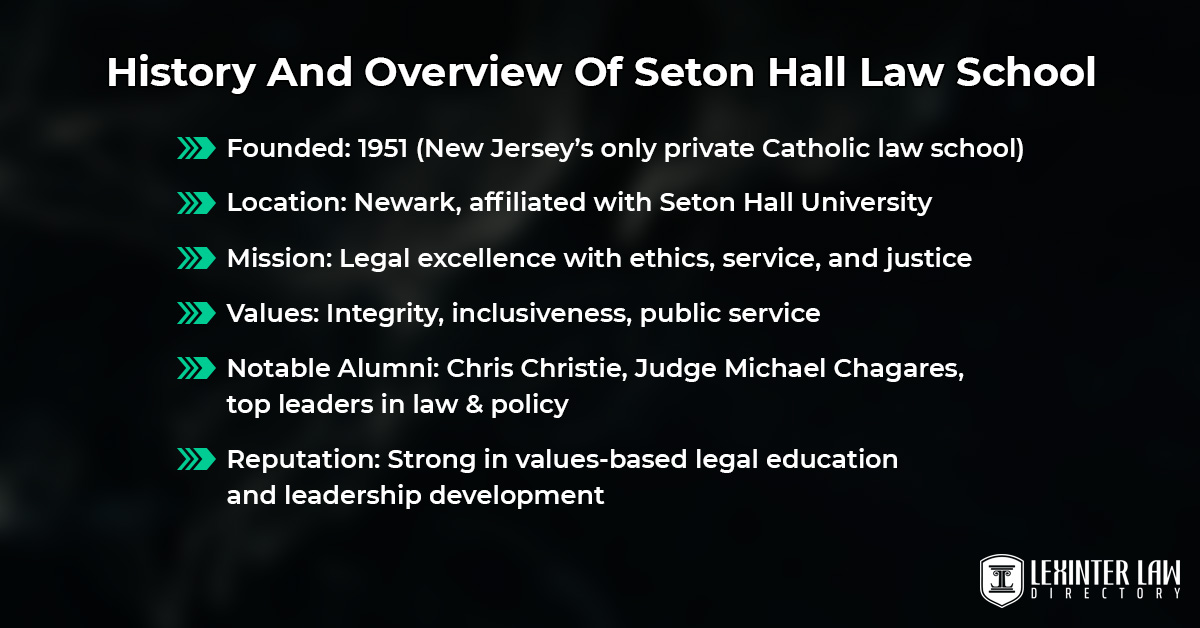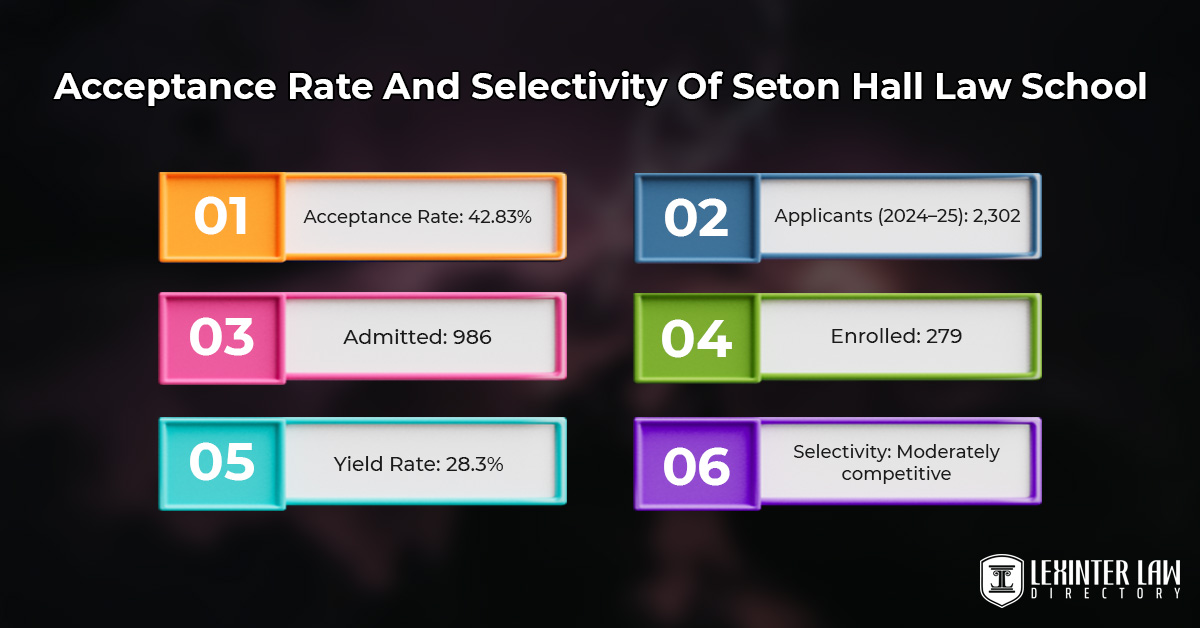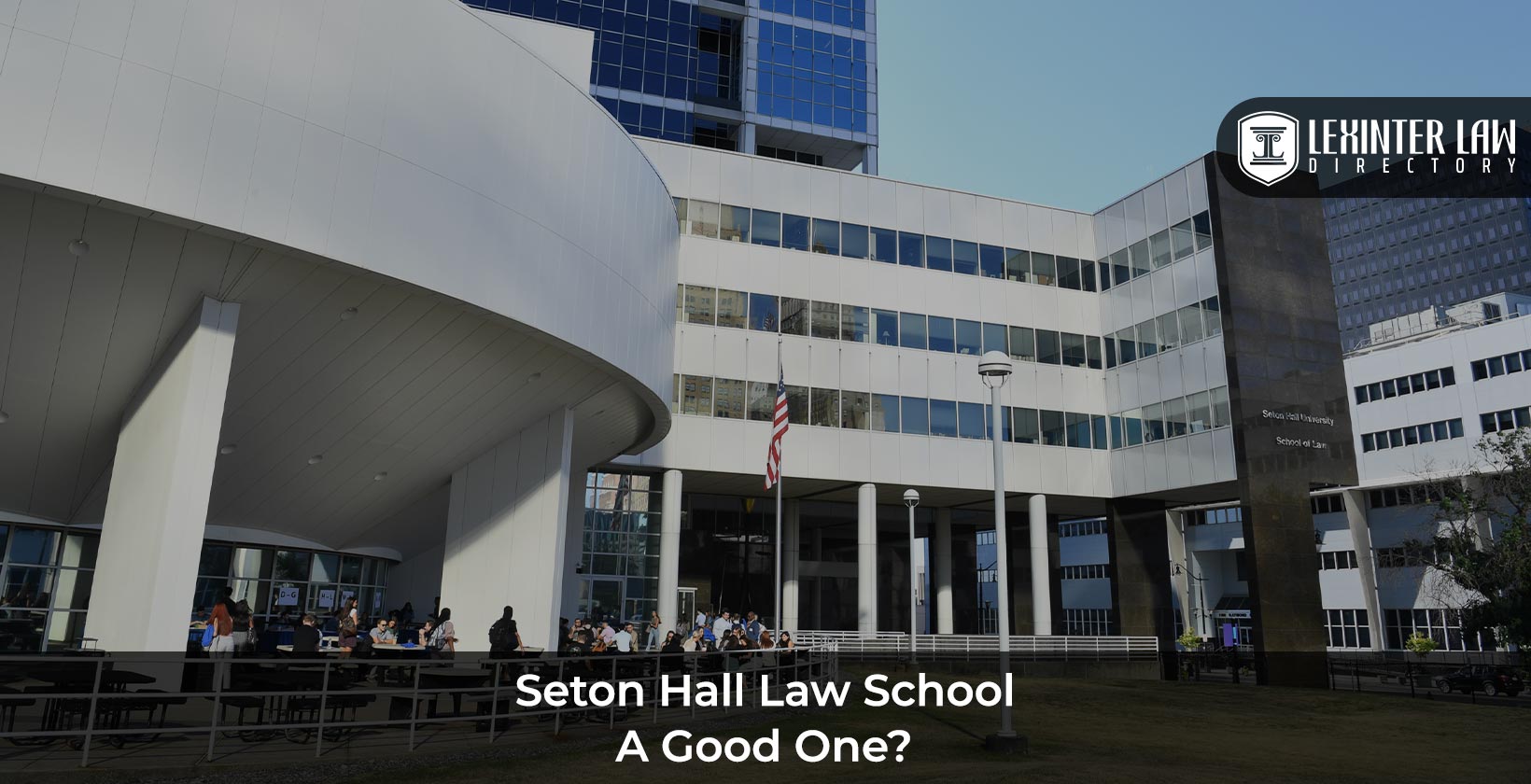Seton Hall Law School – A Good One?
Seton Hall Law School isn’t just another name on a list of law schools — it’s a dynamic training ground where future legal minds are forged. Nestled in the heart of Newark, New Jersey, it blends academic rigor with real-world impact.
Whether you’re dreaming of courtrooms or compliance boards, Seton Hall offers a path filled with purpose, mentorship, and opportunity. So, what makes it a standout in the legal education landscape? Let’s dive into the programs, people, and principles that make Seton Hall Law School an institution worth discussing.
Table of Contents
History And Overview

Understanding Seton Hall Law School’s historical journey and core principles is essential to understanding its distinctiveness. Let’s delve into its founding, guiding mission, and influential alumni who have shaped the legal world.
Founding And Establishment Of Seton Hall Law School
Founded in 1951, Seton Hall Law School emerged as New Jersey’s only private Catholic law school. Located in Newark and affiliated with Seton Hall University, the school has built a solid reputation for legal excellence. It was established to provide accessible, values-based legal education rooted in service, scholarship, and commitment to justice.
Mission And Values Of The Institution
Seton Hall Law is grounded in a mission that blends academic rigor with ethical responsibility. The school fosters integrity, inclusiveness, and public service while preparing students for leadership in diverse legal environments. Its values emphasize justice, professional excellence, and a deep commitment to helping students serve both clients and the broader community.
Notable Alumni And Their Achievements
Seton Hall Law’s alumni network features prominent leaders such as former New Jersey Governor Chris Christie and Chief Judge Michael Chagares of the U.S. Court of Appeals. Graduates have become judges, CEOs, policymakers, and renowned litigators, demonstrating the school’s long-standing impact on the legal profession at state, national, and global levels.
Location And Facilities
The physical setting of Seton Hall Law contributes to the student experience in many ways. From its central Newark location to its advanced facilities and accessible infrastructure, let’s explore what the campus has to offer.
Address And Campus Location Of Seton Hall Law School
Seton Hall Law School is located at One Newark Center, in the vibrant downtown area of Newark, New Jersey. This strategic location places students near key legal institutions like state and federal courts. Its urban setting provides rich opportunities for professional networking, internships, and real-world legal exposure within walking distance from campus.
Overview Of The Campus Facilities And Resources
The campus boasts a modern law library, fully equipped moot courtrooms, smart classrooms, and collaborative learning spaces. Students also benefit from lounges, dining options, and tech-enabled study environments. These resources foster a dynamic academic atmosphere, supporting experiential learning and legal research while creating a community-oriented academic and social development setting.
When people talk about Seton Hall Law School ranking, the amazing facilities are one of the things that help make it stand out among the top-tier law schools.
Accessibility And Transportation Options
Commuting to Seton Hall Law School is convenient thanks to its proximity to Newark Penn Station, offering NJ Transit, PATH, and Amtrak services. The school is also accessible via major highways and is just minutes from Newark Liberty International Airport. Ample public transportation and walkability make the campus highly accessible for both local and commuting students.
Academic Programs
Seton Hall Law School offers a robust and flexible curriculum tailored to meet students’ diverse interests. Let’s examine its degree programs, areas of specialization, and highly qualified faculty.
Overview Of The Various J.D. And LL.M. Programs Offered
Seton Hall Law School offers full-time and part-time J.D. programs to develop foundational legal skills. Its LL.M. degrees cater to professionals seeking advanced Health Law, Financial Compliance, and Intellectual Property training. Each program blends doctrinal coursework with experiential opportunities, preparing graduates for success in varied legal and regulatory careers.
Specializations And Areas Of Expertise
Seton Hall Law School is not just a one-size-fits-all place. Students can tailor their legal education through focused tracks in Health Law, Intellectual Property, Family Law, Corporate Compliance, and Public Interest. These specialized pathways integrate clinical practice, externships, and research, allowing students to gain targeted knowledge and hands-on experience. Seton Hall’s centers of excellence support innovation and deep subject-matter engagement in each area.
Faculty Qualifications And Expertise
Seton Hall Law’s faculty includes nationally recognized scholars, seasoned practitioners, and dedicated educators. Professors bring expertise in constitutional law, healthcare regulation, corporate governance, and emerging legal fields. Many are published authors and active contributors to policy reform. Their mentorship and research initiatives enrich the student experience and uphold the school’s academic reputation.
Rankings And Accreditation
Understanding Seton Hall Law’s placement among peer institutions and its formal accreditations highlights the school’s overall excellence. Below, we examine its rankings and recognitions by national and legal education authorities.
Current Ranking Of Seton Hall Law School
Seton Hall Law School is like a star athlete among the best law schools in New Jersey. As of 2025, Seton Hall Law School ranks 71st among the nation’s best law schools according to U.S. News & World Report. Its part-time program is highly regarded, currently ranked 22nd. These rankings reflect the school’s academic strength, growing national visibility, and its commitment to providing flexible, high-quality legal education for diverse student needs.
Accreditation And Recognition By Relevant Legal Bodies
Seton Hall Law School is fully accredited by the American Bar Association (ABA), confirming its compliance with national legal education standards. It is also a member of the Association of American Law Schools (AALS), reinforcing its role as a respected institution committed to scholarship, integrity, and the preparation of skilled, ethical legal professionals.
Admissions And Acceptance Rate
Admissions at Seton Hall Law are competitive yet accessible, reflecting a balanced approach to academic excellence. Let’s break down the criteria, acceptance statistics, and how to submit a strong application.
Admission Requirements For Prospective Students
Applicants must submit a completed application via LSAC, including transcripts, two letters of recommendation, a personal statement, and a resume. Standardized test scores (LSAT or GRE) are required. Seton Hall employs a holistic review process, considering academic credentials, personal achievements, and potential contributions to the law school community.
Acceptance Rate And Selectivity Of Seton Hall Law School

Not everyone can get into Seton Hall School of Law. For the 2024–2025 academic year, the School had an acceptance rate of 42.83%. Out of 2,302 applicants, 986 were admitted, and 279 enrolled, resulting in a yield rate of 28.3%. This positions Seton Hall Law as a moderately selective institution among U.S. law schools.
Tips For A Successful Application
To strengthen your application, ensure clarity and authenticity in your personal statement, highlighting unique experiences and motivations for pursuing law.
Secure strong letters of recommendation from individuals familiar with your academic or professional work. Submit all materials promptly, and consider visiting the campus or attending information sessions to demonstrate genuine interest.
With a good recipe (and maybe a little luck), you might just find yourself studying at one of the best law schools around!
Student Life And Support
Beyond academics, Seton Hall Law fosters a vibrant community with enriching extracurriculars and robust student support services. Learn more about student culture, involvement opportunities, and the extensive academic and career support available.
Campus Culture And Student Diversity
Seton Hall Law celebrates diversity in all forms, fostering an inclusive environment where students from various backgrounds thrive. Programs like the Legal Education Opportunities (LEO) initiative support students facing social, economic, or educational challenges, promoting resilience and leadership within the legal community.
Extracurricular Activities, Clubs, And Organizations
With over 30 student organizations, Seton Hall Law offers ample opportunities for involvement beyond the classroom. Groups like the Student Bar Association, Black Law Students Association, and others provide platforms for professional development, community service, and networking, enriching the student experience and fostering a sense of community.
Academic And Career Support Services For Students
Seton Hall Law’s Office of Career Services offers personalized guidance, including resume reviews, mock interviews, and job search strategies. Students also benefit from academic advising, counseling services, and workshops designed to support their educational journey and prepare them for successful legal careers.
Career Opportunities And Internships
One of Seton Hall Law School’s strongest assets is its track record in graduate employment. This section explores graduate outcomes and how partnerships with legal organizations provide real-world learning opportunities.
Overview Of Career Prospects For Seton Hall Law School Graduates
Seton Hall Law School boasts a 96.83% employment rate for its graduates, with 85.52% securing positions requiring bar passage. Notably, over 40% of the Class of 2024 obtained judicial clerkships, reflecting the school’s emphasis on practical experience and strong alumni networks.
Partnerships With Legal Firms And Organizations For Internships
Seton Hall Law, known for its balanced acceptance rate, provides robust externship opportunities that allow students to earn academic credit while gaining real-world legal experience. From federal and state courts to government agencies and even international placements like the Court of Justice of the European Union, these programs sharpen students’ legal skills and expand their professional networks.
Notable Faculty And Research
Seton Hall Law is home to a faculty deeply engaged in scholarship and innovation. Below, we spotlight the contributions and cutting-edge research initiatives that further distinguish the school’s academic reputation.
Highlights Of Prominent Faculty Members And Their Contributions
Seton Hall Law boasts distinguished faculty like Professor Mark Denbeaux, renowned for his work on Guantanamo Bay detainee rights, and Professor Paula Franzese, a leading authority on property law and ethics. Their impactful scholarship and dedication to teaching have significantly influenced legal education and public policy.
Ongoing Research Projects And Publications From The Faculty
Seton Hall Law faculty are actively engaged in diverse research areas, including health law, constitutional rights, and cybersecurity. Their recent publications address critical issues like the Indian Child Welfare Act and disability rights, reflecting the school’s commitment to advancing legal scholarship and addressing contemporary societal challenges.
Alumni Network And Connections
Graduates of Seton Hall Law continue to impact the legal field through a robust alumni network. This section highlights how alumni relations foster lifelong support, mentorship, and professional advancement opportunities.
Description Of Seton Hall Law School’s Alumni Network
Seton Hall Law’s alumni network spans judges, attorneys, policymakers, and corporate leaders across the country. Alumni remain actively engaged through mentorship, guest lectures, and networking events. Their involvement strengthens ties between past and current students, creating a dynamic professional community that supports legal innovation and career growth across diverse sectors and geographic regions.
Benefits Of Being Part Of The Alumni Community
Alumni benefit from exclusive networking events, continuing legal education programs, and career development services. The alumni office helps facilitate job referrals, peer mentoring, and connections within top firms and agencies. These resources enable graduates to stay connected, expand opportunities, and contribute meaningfully to Seton Hall Law’s enduring legacy of professional excellence.
Interested in exploring the law schools in Idaho? Read this guide.
Frequently Asked Questions About Seton Hall Law School
1. What Is Seton Law Ranked?
As of 2025, Seton Hall University School of Law is ranked No. 71 nationally by U.S. News & World Report. Its part-time law program holds the No. 22 spot, and its Health Law specialty is ranked No. 9 in the nation, reflecting its strength in that field.
2. What Is The Acceptance Rate For Seton Hall Law School?
For the 2024–2025 academic year, Seton Hall University School of Law had an acceptance rate of 42.83%. Out of 2,302 applicants, 986 were admitted, and 279 enrolled, resulting in a yield rate of 28.3%. This positions Seton Hall Law as a moderately selective institution among U.S. law schools.
Conclusion
Seton Hall Law School is a compelling choice for aspiring legal professionals seeking academic excellence and real-world readiness. With nationally recognized programs, a distinguished faculty, and a diverse, supportive community, it offers an environment where students can thrive intellectually and professionally.
Seton Hall Law School’s commitment to ethical leadership, social justice, and experiential learning ensures graduates are prepared for the legal field and positioned to make meaningful contributions to society. And this reputed law school is ready to help you on your journey. So put on your thinking cap, grab your law books, and get ready to discover a world of learning!
Did you find this article helpful? You can also explore New York Law School.

